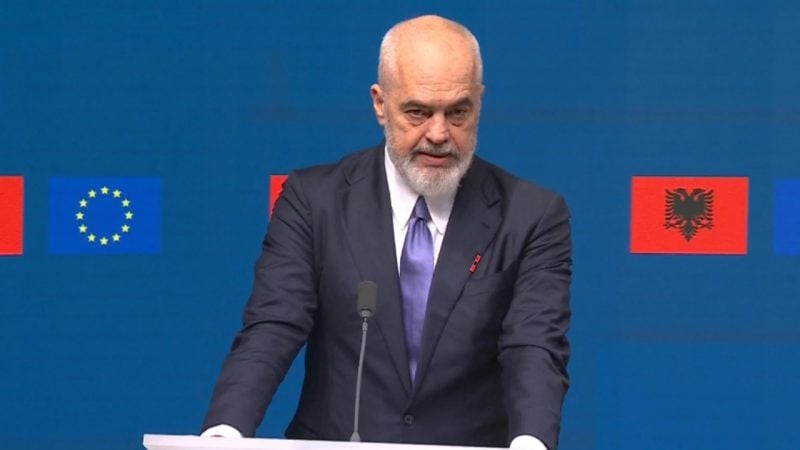 The Washington Agreement Must Be Reactivated!
The Washington Agreement Must Be Reactivated! The obsession of the Albanian Prime Minister Sali Berisha for
controlling all independent powers is a concerning phenomenon in his
political career.
His return in power after eight years in opposition was commented that Berisha has changed, by the cable of the US Embassy, titled “The rebellion of the Prime Minister Berisha” proves the contrary, highly emphasizing his obsession in controlling the institutions whose independence is guaranteed by the Constitution.
This is the full text of the cable sent to the US state department on five September 2008.
Since the Bucharest Summit in April, Prime Minister Berisha has embarked on series of attempts to consolidate his power at the expense of key independent institutions, including efforts to undermine and interfere in the work of the Prosecutor General, obstruct the ongoing investigation into the March Gerdec explosion, take greater control of the intelligence services, and muzzle free media.
There are several factors apparently motivating Berisha in this trend: ear that the ongoing Gerdec investigation will implicate his son; a desire to strengthen his hand in the run-up to next summer’s parliamentary elections; and the erroneous perception that Albania’s NTO invitation has lifted international scrutiny from Albania, giving Berisha a perceived green light to step back from democratic reforms.
Topalli also sent an open letter to Rama, directing the PG on how to carry out the Gerdec investigation. The new draft PG law, which seeks to undermine the independence and status of the PG by providing for the automatic suspension of lower-level prosecutors accused of any crime, no matter how minor.
Reducing the pay of the PG; and increasing political control over prosecutors by the Ministry of Justice by adding another MOJ representative to the Council of the Prosecutor’s Office. The original draft law, which was much worse, was only reluctantly changed by drafters after strong private and public opposition by the Embassy and others in the foreign diplomatic community.
PM Berisha and Speaker Topalli have tried both publicly and privately to obstruct efforts by the PG and others to fully investigate the March Gerdec explosion.
Both Berisha and Topalli tried unsuccessfully to obstruct PG Rama’s efforts to convince Parliament to strip former Minister of Defense Mediu of his immunity, a key target of the investigation.
The Deputy Head of the High Council of Justice, which plays a major role in the nomination and supervision of judges, told the Ambassador that Berisha had angrily confronted him and accused him of “limiting the government’s influence over the judiciary,” then threatened to have the Deputy Head removed from office and “publicly ruined.”
Shortly after the Gerdec explosion, Berisha began a public campaign to blame the state intelligence service (SHISH) for the tragedy, then used Gerdec as an excuse to push to make SHISH subordinate to a new Department of Security that would report directly to the PM.
The Ministry of Culture is trying to force Albania’s most popular independent media outlet Top Channel – often a critic of the Berisha administration – out of its current offices, in violation of a legal lease Top Channel signed with the building’s landlord, the Ministry of Economy, under the jurisdiction of the Ministry of Culture.
An OSCE review has determined that a new draft media law could increase “the level of political control by the government” over the media and potentially lead to the closure of a pro-opposition TV station in Tirana.
For all these matters, Withers writes this comment:
“Taken together, Berisha’s attempts to assert greater control over the judicial system, media and intelligence services, plus his attempts to undermine the Gerdec investigation, reveal an unmistakable and disturbing trend.
The common denominator seems to be an attempt to negate the ability of key institutions to voice opinions of take actions contrary to the views of the PM.
His immediate objectives seem to be to control the Gerdec investigation, in that SHISH, the courts, the PG and the media all play a major role in exposing the shady business deals and corruption that led to the March explosion, as well as and most importantly possible links to Berisha’s son, who is rumored to have had a business interest in Gerdec.
A second motivation is certainly Berisha’s wish to control the upcoming parliamentary elections, which are currently scheduled for June of 2009. The Embassy has raised USG concerns about such counterproductive moves on the part of a potential NATO ally in private conversations with senior GOA officials, including Berisha himself, and in occasional public statements, as have increasingly key international players, including OSCE, EC, human rights groups, and other NGOs.
These efforts have had some success in stemming the tide. However, with next year’s election likely to be close and the Gerdec investigation creeping nearer to implicating the PM’s family members, Berisha’s forays against independent institutions are likely to be ongoing. We must make sure he understands how carefully we are watching.
Top Channel







